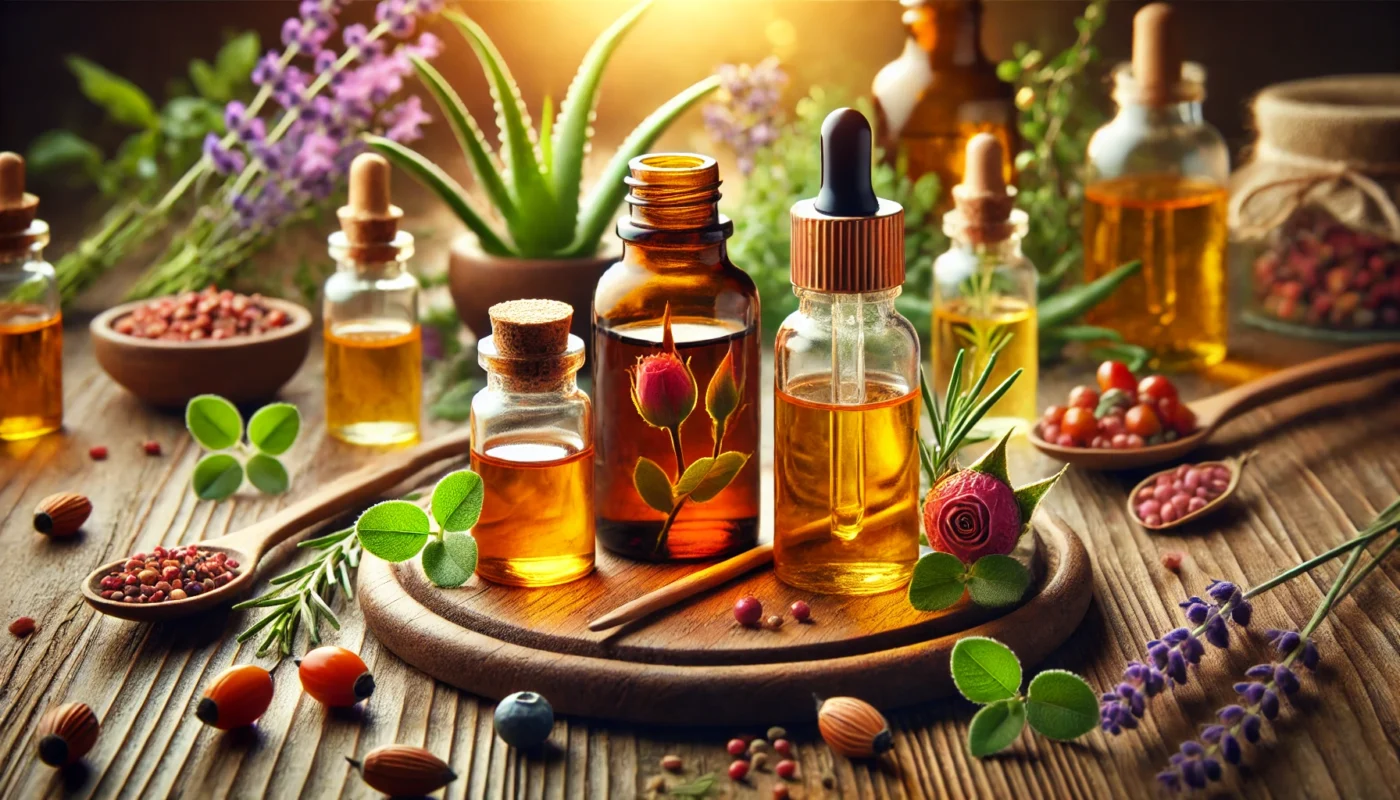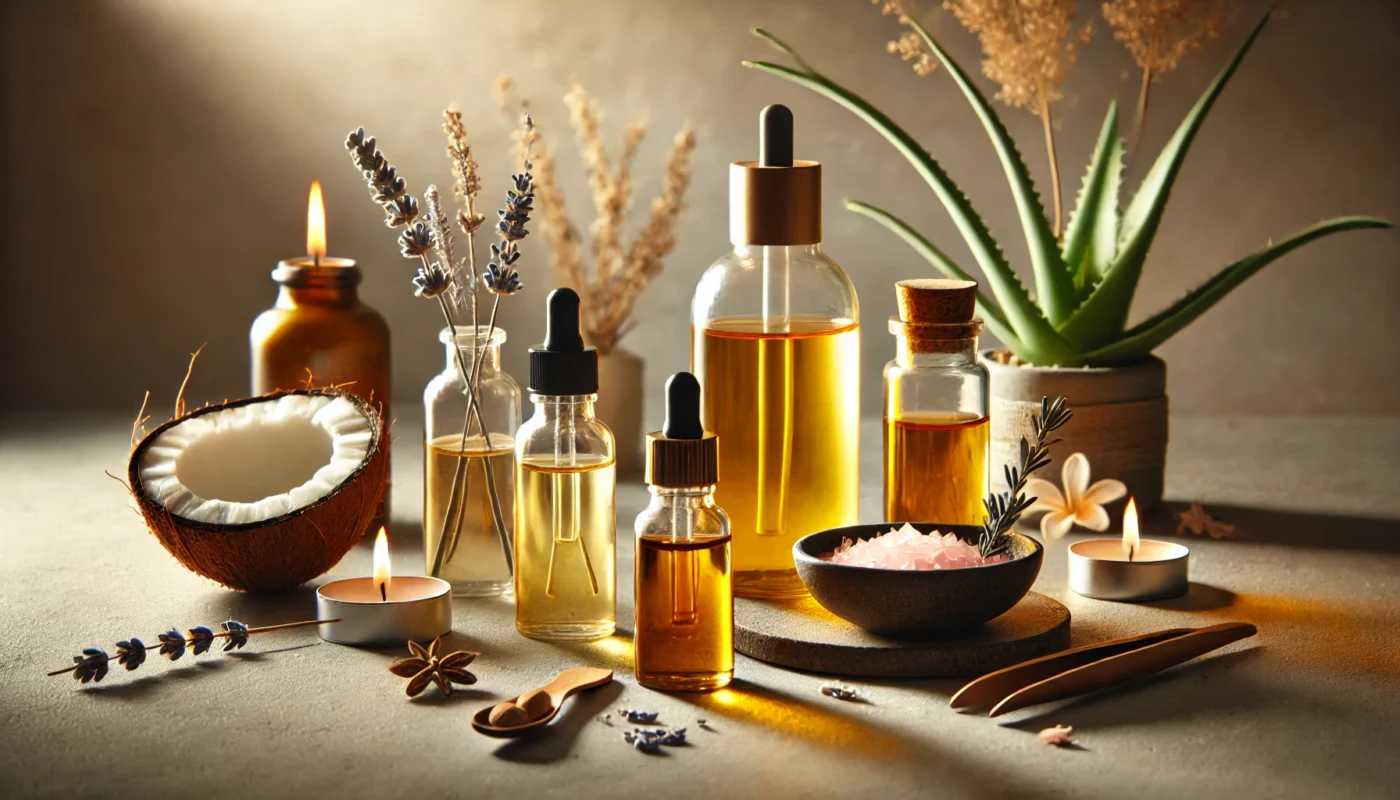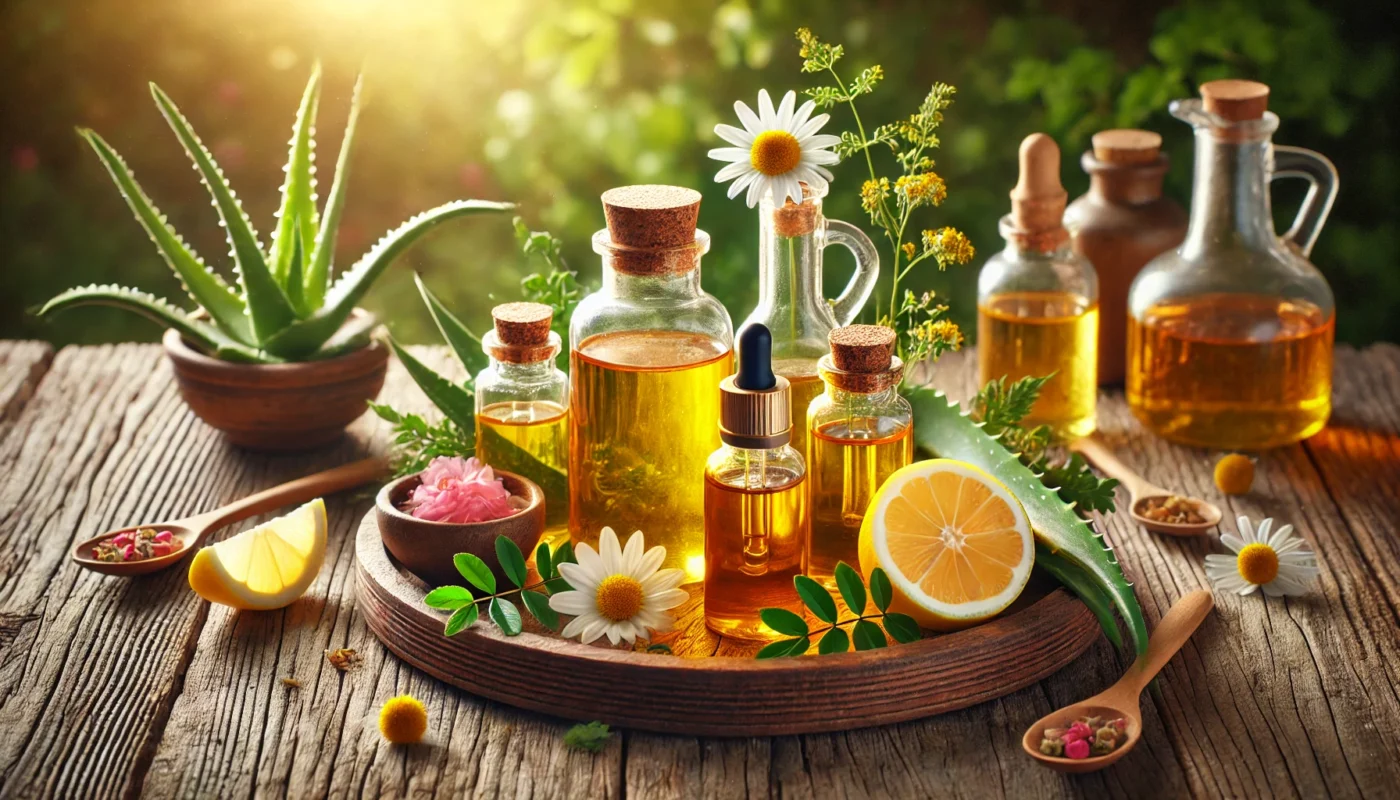Before diving into the specific oils, it’s essential to understand how scars form. Scars are the result of the natural healing process following an injury to the skin. They form when the dermis, the second layer of skin, is damaged. The body produces collagen fibers to repair the damage, and this fibrous tissue results in a scar. Although scars are a natural part of healing, they can sometimes be aesthetically displeasing or uncomfortable.
You may also like: Home Remedies: Fight Cut Infections Naturally
The Healing Process Explained
The healing process begins immediately after an injury occurs. Initially, the body focuses on stopping the bleeding through clot formation. Once the bleeding is under control, inflammation sets in to prevent infection and clear out damaged cells. This stage is crucial for preparing the wound for the repair phase, where new tissue forms.
Collagen and Scar Formation
Collagen plays a pivotal role in scar formation. While it’s a protein that provides strength and structure to the skin, its overproduction during healing results in scar tissue. This tissue is different from normal skin, often being tougher and less flexible. Understanding this helps us appreciate why managing collagen production is key in scar treatment.
Types of Scars
There are various types of scars, each with distinct characteristics. Hypertrophic scars are raised and red, often resulting from excessive collagen. Keloids are similar but extend beyond the original wound. Atrophic scars, like those from acne, are sunken due to tissue loss. Recognizing the type of scar can guide the choice of treatment.
The Role of Natural Oils in Scar Healing
Natural oils, particularly essential oils, have gained popularity for their potential to improve skin health and appearance. These oils are derived from plants and are highly concentrated, containing the essence of the plant’s fragrance and healing properties. Many essential oils possess anti-inflammatory, antibacterial, and antioxidant properties, making them suitable for reducing scar visibility and promoting overall skin health.
The Science Behind Essential Oils
Essential oils are composed of small molecules that can penetrate the skin’s surface and deliver therapeutic benefits. Their effectiveness lies in their ability to reach deeper skin layers, influencing cellular activity. This molecular capability is why essential oils are often more potent than other topical treatments.
Anti-inflammatory and Antibacterial Properties
The anti-inflammatory properties of essential oils can help reduce redness and swelling associated with scars. Oils like lavender and chamomile soothe the skin and promote a calmer appearance. Antibacterial oils, such as tea tree oil, prevent infections that can worsen scars, ensuring a healthier healing environment.
Antioxidant Effects
Antioxidants play a crucial role in protecting skin cells from damage by free radicals. Oils rich in antioxidants, like rosehip seed oil, combat oxidative stress, which can hinder the skin’s ability to heal properly. By neutralizing these free radicals, antioxidant-rich oils support healthier skin regeneration.

What Oil Heals and Fades Scars?
Several oils stand out when it comes to scar healing. These include:
Rosehip Seed Oil
Rosehip seed oil is packed with essential fatty acids and vitamins, making it a powerhouse for skin regeneration. Its ability to improve skin texture and reduce discoloration is well-documented. Applying this oil regularly can significantly enhance the appearance of scars over time.
Lavender Oil
Lavender oil’s soothing aroma is just the beginning of its benefits. It promotes wound healing by encouraging new tissue growth and reducing scar formation. Its calming properties also help alleviate any stress associated with skin imperfections, promoting overall well-being.
Helichrysum Oil
Often referred to as the “everlasting” oil, helichrysum is prized for its skin-rejuvenating properties. It aids in reducing inflammation and promoting skin cell turnover, which are vital for scar reduction. Regular use can result in smoother, more even-toned skin.
Essential Oils to Heal Wounds
When considering essential oils for wound healing, look for those with antiseptic and anti-inflammatory properties. Some of the best include:
Tea Tree Oil
Known for its powerful antiseptic properties, tea tree oil can help prevent infection and promote healing. Its ability to cleanse the wound area ensures that scars do not worsen due to bacterial invasion. Incorporating tea tree oil into your routine can be a proactive measure in scar prevention.
Chamomile Oil
This gentle oil is excellent for soothing irritated skin and reducing inflammation. Chamomile’s calming effect is beneficial for sensitive skin types, minimizing the risk of irritation. Its consistent use can support a less aggressive healing process, leading to reduced scar visibility.
Eucalyptus Oil
Eucalyptus oil’s antiseptic nature makes it a valuable addition to wound care. It not only cleanses the wound but also supports the immune system in fighting off potential infections. Its refreshing scent also provides a therapeutic experience, enhancing the healing journey.
Best Essential Oils for Scars
Choosing the right essential oil for scar treatment depends on the type and age of the scar. Here are some recommendations:
Frankincense Oil
Frankincense oil is revered for its anti-inflammatory and skin-healing properties. It aids in reducing the appearance of scars by promoting new cell growth and improving skin elasticity. Its regular application can lead to a noticeable improvement in scar texture.
Geranium Oil
Geranium oil helps in balancing skin oils and promotes healing, making it effective for scars. Its astringent properties tighten the skin, reducing the appearance of scars. Additionally, geranium oil’s pleasant fragrance adds an uplifting element to your skincare routine.
Myrrh Oil
Myrrh oil is known for its ability to rejuvenate the skin and promote healing. Its antioxidant properties protect the skin from environmental stressors, aiding in scar reduction. Incorporating myrrh oil into your regimen can enhance the skin’s resilience and appearance.

Does Tea Tree Oil Heal Scars?
Tea tree oil is renowned for its antimicrobial and anti-inflammatory properties, which can help in the initial healing phase of a wound. While it may not directly fade scars, it can prevent infection and reduce inflammation, which are critical in the early stages of scar formation.
The Preventative Role of Tea Tree Oil
Tea tree oil’s primary benefit lies in its ability to create a clean environment for healing. By preventing infections, it ensures that the wound can heal without complications, reducing the likelihood of prominent scar formation. This preventative role is crucial for optimal scar management.
Complementary Use with Other Oils
While tea tree oil is excellent for initial wound care, combining it with other oils can enhance its effectiveness. For example, pairing it with rosehip seed oil can support both the healing and fading aspects of scar treatment. Such combinations can offer a comprehensive approach to scar reduction.
Safety Considerations
Although tea tree oil is beneficial, it’s important to use it correctly to avoid skin irritation. Diluting it with a carrier oil and performing a patch test can prevent adverse reactions. Ensuring safe use allows you to reap the full benefits of tea tree oil without compromising skin health.
Can Coconut Oil Help with Scars?
Coconut oil is a favorite in natural skincare due to its moisturizing properties. It contains lauric acid, which has antimicrobial properties, and can help keep the skin hydrated. While it may not directly fade scars, it can improve skin health and reduce the formation of new scars by keeping the skin supple and protected.
Hydration and Skin Elasticity
One of coconut oil’s strengths is its ability to deeply moisturize the skin. Well-hydrated skin is more elastic and less prone to forming rigid scar tissue. By maintaining skin elasticity, coconut oil can aid in minimizing the appearance of existing scars.
Antimicrobial Benefits
Lauric acid, a component of coconut oil, provides antimicrobial benefits that protect the skin from infections. This protection is crucial in preventing complications that can lead to more pronounced scarring. Regular application of coconut oil can support a healthier skin environment.
Use in Combination with Other Treatments
Coconut oil can be used alongside other scar treatments to enhance results. Its emollient properties complement the healing effects of essential oils, creating a synergistic effect. Combining treatments can maximize skin health benefits and optimize scar reduction efforts.
Best Scar Oil After Surgery
Post-surgery care is crucial for minimizing scar appearance. Oils that provide hydration and promote collagen production are ideal. Consider:
Vitamin E Oil
Vitamin E oil is known for its ability to regenerate skin cells, making it a staple for post-surgery scar care. Its antioxidant properties protect new skin from oxidative stress, supporting a smoother healing process. Consistent use can lead to softer, less visible scars.
Calendula Oil
With its anti-inflammatory and healing properties, calendula oil is excellent for soothing and healing post-surgery skin. It reduces redness and irritation, promoting a more comfortable recovery. Calendula oil’s gentle nature makes it suitable for sensitive skin areas after surgery.
Jojoba Oil
Jojoba oil closely resembles the skin’s natural oils, making it an effective moisturizer. Its ability to balance skin oil production supports overall skin health and aids in scar reduction. Applying jojoba oil post-surgery can enhance hydration without clogging pores.
How to Use Essential Oils for Healing Scars
When using essential oils, it’s important to follow best practices to ensure safety and effectiveness:
Dilution
Essential oils are potent and should be diluted with a carrier oil such as jojoba, almond, or coconut oil before application. This not only ensures safety but also aids in even distribution across the skin. Proper dilution prevents potential skin irritation and enhances absorption.
Patch Test
Always conduct a patch test to check for any allergic reactions. This involves applying a small amount of the diluted oil to an inconspicuous area of the skin. Observing any adverse reactions over 24 hours can prevent widespread irritation and ensure a safe skincare routine.
Consistent Application
For best results, apply the oil blend consistently over time. Regular application supports gradual improvement in scar appearance, as the skin undergoes renewal cycles. Patience and consistency are key for achieving the desired outcome in scar treatment.
Massage
Gently massaging the area can improve circulation and aid in the healing process. This not only enhances the effectiveness of the oils but also promotes relaxation and stress relief. Incorporating massage into your routine can make the treatment more enjoyable and beneficial.

Conclusion
Natural oils offer a holistic approach to reducing scar appearance and improving skin health. While results can vary based on individual skin types and the nature of the scar, incorporating these oils into your skincare routine can provide numerous benefits. Whether you’re dealing with post-surgery scars, acne marks, or stretch marks, exploring the world of natural oils could be a step towards smoother, healthier skin.
The Importance of Patience
Remember, patience and consistency are key when using natural remedies. Scar healing is a gradual process, and immediate results are rare. Staying committed to your routine allows the skin to adapt and respond positively over time.
Consulting with Professionals
Consulting with a healthcare professional before starting any new treatment is always recommended. Professionals can provide personalized advice and ensure that your chosen oils won’t interfere with existing conditions or treatments. Their guidance can enhance the effectiveness and safety of your scar care routine.
Embracing Nature’s Power
By embracing the power of nature, you can take proactive steps towards achieving your skincare goals and enhancing your overall wellbeing. Natural oils offer a sustainable and gentle approach to skincare, aligning with a holistic lifestyle. Incorporating them into your daily regimen can lead to long-term skin health and confidence.
Further Reading:
Top Five Oils for Reducing the Appearance of Scars
What to Know About Rosehip Oil for Acne Scars
coconut oil, scar treatment, skincare, essential oils, natural remedies, post-surgery care, moisturizing oils, vitamin E oil, calendula oil, jojoba oil, skin health, healing scars, holistic skincare, antimicrobial benefits, skin elasticity, scar reduction, beauty tips, natural oils, skincare routine, patient care
Important Note: The information contained in this article is for general informational purposes only, and should not be construed as health or medical advice, nor is it intended to diagnose, prevent, treat, or cure any disease or health condition. Before embarking on any diet, fitness regimen, or program of nutritional supplementation, it is advisable to consult your healthcare professional in order to determine its safety and probable efficacy in terms of your individual state of health.
Regarding Nutritional Supplements Or Other Non-Prescription Health Products: If any nutritional supplements or other non-prescription health products are mentioned in the foregoing article, any claims or statements made about them have not been evaluated by the U.S. Food and Drug Administration, and such nutritional supplements or other health products are not intended to diagnose, treat, cure, or prevent any disease.

